Taking on “Last One Mile Support”: Swiftly delivering COVID-19 vaccinations to people in developing countries
2021.09.21
Amidst the continuing global spread of the COVID-19 infection, JICA is accelerating its cooperation to establish a system for prompt vaccination in developing countries. Since June 30, we have initiated new grant aid projects in six countries and one region including Palestine, Malawi, Mozambique, Mongolia, the Philippines, Ghana, and Senegal, to provide equipment such as cooling refrigerators and transport vehicles that are necessary for the cold chain (low-temperature distribution) infrastructure so that more people will be able to receive vaccinations.
In order to contain COVID-19 on a global scale and restore safety and security to the lives of people, establishing a system to accelerate vaccination is of paramount importance, not only in developed countries but also in developing countries. Based on the trust built with developing countries over the years, JICA is carefully identifying their needs and working together with Japanese private companies to ensure that vaccines promptly and safely reach vaccination sites in these countries. JICA continues the challenge to take on the final step of the “Last One Mile Support.”
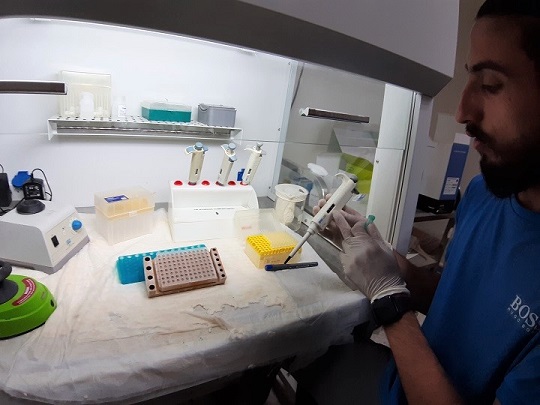
A medical staff member preparing a PCR test at a COVID-19 laboratory in Palestine. The Palestinian medical system has not been able to keep pace with the spread of COVID-19, and there is an urgent need for cooperation in terms of both equipment and medical personnel
“In April, JICA and the Ministry of Foreign Affairs began studying what cooperation could be provided to which countries, and what equipment is in need. Then, the decision on implementation was officially made within a mere three months, which was unprecedentedly swift (Note). In addition to the trust that had been built by JICA’s local offices through daily and careful dialogue with the officials at the Ministry of Health in counterpart countries, the implementation of the initiative was made possible through the efforts of the entire JICA team, including all related departments exchanging information and cooperating with each other while executing their respective roles.”
(Note) A decision endorsed by the Japanese government in a cabinet meeting
This was explained by KUBOKURA Ken, director of the Office for COVID-19 Response, JICA. The equipment and materials to bolster the vaccination system in the seven countries will be provided this time as “grant aid,” a form of financial assistance extended to developing countries without the obligation of repayment. Typically, it takes a year or more for decisions to be made after surveys are conducted to specify the details of the cooperation, but given the imminent COVID-19 situation, the financial assistance was made possible in an extremely short period of time.
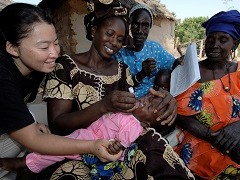
A midwife and a Japan Overseas Cooperation Volunteers (JOCV) member (left) provides support for a polio vaccination in rural Senegal. JICA is assisting in improving the health and sanitation services in developing countries
Within a limited time frame, JICA was able to meticulously discuss the necessary equipment with the Ministries of Health in each country, thanks to the relationship of trust that has been cultivated over the years. Moreover, JICA will continue to provide comprehensive assistance that goes beyond the provision of equipment, such as human resource development for its maintenance and management.
Palestine was one of the first recipients selected to receive the equipment. The Palestinian Minister of Health Mai al-Kaila said, “With the distribution of vaccines becoming an issue, we are extremely grateful for the equipment such as the refrigerated transport vehicles and portable freezers.”
Since the threat of infectious diseases has been small in Palestine until now, there are no research centers for infectious diseases like those in Asia and Africa. From the early days of the COVID-19 pandemic to date, the Palestinian Authority has been lagging behind in its response due to a lack of equipment for testing, treatment, and vaccinations. Its know-how on establishing a vaccination system is also insufficient.
SAKAMOTO Ritsuko, senior representative of the JICA Palestine Office, describes the current urgent situation as follows.
“We visited several COVID-19 laboratories on the West Bank. Although they have the bare minimum number of equipment, if any of it breaks down, there are no backups. Many laboratory technicians are dispatched from other international organizations on a short-term basis, so there is no way to predict when the testing system will collapse. In addition, there are no test kits available for the Delta variant, which is now a global threat. The Delta variant is on the rise in neighboring Israel, and an influx into the West Bank has been seen since August. We are eagerly looking forward to the Last One Mile Support to provide equipment to improve this situation.”
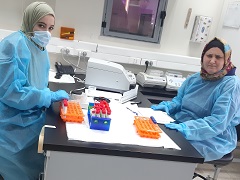
Medical staff at the Ministry of Health’s Central Public Health Laboratory for COVID-19 in Ramallah, West Bank
“We visited several COVID-19 laboratories on the West Bank. Although they have the bare minimum number of equipment, if any of it breaks down, there are no backups. Many laboratory technicians are dispatched from other international organizations on a short-term basis, so there is no way to predict when the testing system will collapse. In addition, there are no test kits available for the Delta variant, which is now a global threat. The Delta variant is on the rise in neighboring Israel, and an influx into the West Bank has been seen since August. We are eagerly looking forward to the Last One Mile Support to provide equipment to improve this situation.”
As part of the Last One Mile Support, JICA will provide Palestine with cold chain equipment as well as the latest laboratory equipment needed to test for COVID-19 (next-generation DNA sequencers, etc.). This equipment is essential to accurately assess the status of infection and monitor the efficacy of vaccines.
In May this year, the only COVID-19 testing laboratory in the Gaza Strip suffered heavy damage in the airstrikes. Further cooperation for the healthcare system is required, and we are preparing so that we can deliver the necessary equipment as soon as possible.
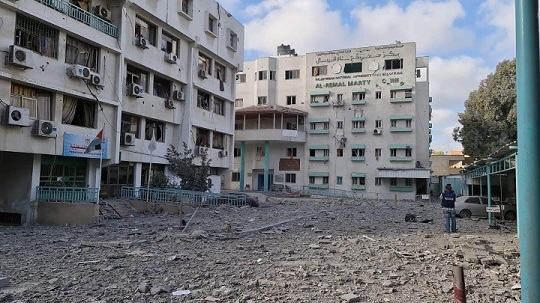
A COVID-19 testing laboratory in the Gaza Strip was severely damaged by airstrikes (the building shown on the right in the photo)
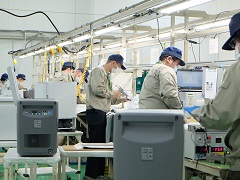
Twinbird Corporation's vaccine transport box production site
Among the equipment to be provided in the assistance to bolster the vaccination system is a vaccine transport box developed by Twinbird Corporation (Tsubame City, Niigata Prefecture), a private company in Japan. This is a compact and portable ultra-low temperature freezer employing the company's patented technology that allows for precise temperature control. More than 10,000 of these units are already in use in Japan for the transportation and storage of COVID-19 vaccines. The device can uniquely draw power from a vehicle's cigar socket (electrical supply device), and its shake-resistant feature makes it possible to transport vaccines to remote areas while ensuring their quality. It is expected to be widely used in rural areas in developing countries where rough roads are common.
In Timor-Leste, this vaccine transport box has already been provided for the purpose of enhancing JICA's training for the Pharmaceutical and Medical Equipment Service Center (SAMES) staff, responsible for the distribution of vaccines. It has been instrumental in delivering vaccines in the suburbs of the capital city of Dili.
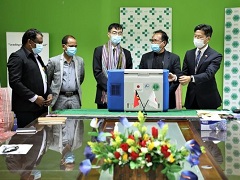
Twinbird Corporation's vaccine transport box supplied to Timor-Leste
It is anticipated that this vaccine transport box will play a major role in promoting vaccination in developing countries going forward. NOMIZU Shigeaki, president and CEO of Twinbird Corporation, commented on the fact that this Japanese-made vaccine transport box, which brings together the metal processing technologies of the Tsubame-Sanjo region in Niigata Prefecture, can contribute to solving social issues on a global scale, such as the prevention of COVID-19 infections. He explained, “More than 20 years ago, when our former president made a wise decision to invest in this technology, and I myself, who inherited his determination, never imagined that the day would come when a novel coronavirus pandemic would occur, and we, Twinbird, would be able to contribute to the world with our vaccine transport boxes.”
“While we are honored to be able to contribute to the Last One Mile Support and to safe and secure vaccinations in developing countries, we will continue to work to make our unique cooling technology available not only for use in vaccinations, but also for a variety of other applications," he said, expressing his desire for further cooperation.
scroll